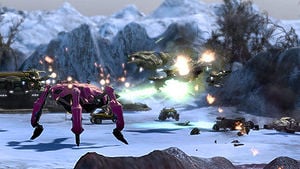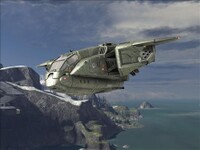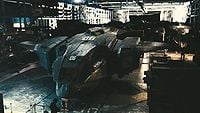D77-TC Pelican: Difference between revisions
From Halopedia, the Halo wiki
No edit summary |
No edit summary |
||
| Line 158: | Line 158: | ||
*In the level ''[[Outskirts]]'' in [[Halo 2]], the Pelican faces in two different directions depending if the difficulty is on Easy or Legendary. | *In the level ''[[Outskirts]]'' in [[Halo 2]], the Pelican faces in two different directions depending if the difficulty is on Easy or Legendary. | ||
*It seems to be based on the real life Mi-24 hind because it is a powerful gunship and also a troop transport. | *It seems to be based on the real life Mi-24 hind because it is a powerful gunship and also a troop transport. | ||
*The Pelican is never use by a player. | |||
*Most Pelican in Halo: Combat Involved are destroyed | |||
==Gallery== | ==Gallery== | ||
Revision as of 10:08, November 14, 2008
The Dropship 77-Troop Carrier (abbreviated D77-TC), more commonly known as the Pelican, is an extremely versatile craft used by the United Nations Space Command, mainly for the pickup and transportation of personnel, vehicles and equipment, although it can also be used as a powerful support gunship.
Background
Prior to November, 2552, the D77-TC Pelican was the primary tactical support aircraft of the UNSC, fulfilling the role of a tactical transport gunship. The Pelican's crew compartments can be sealed and the craft made suitable for limited space flight. The Pelican, however, lacks Slipspace capabilities.
Pelicans are mainly responsible for the rapid infiltration and exertion of troops. They also deliver vehicles and equipment to the battlefield, when required. This tactical advantage means that a conflict can be greatly and quickly influenced, by the delivery of reinforcements and/or equipment by Pelicans.
Standard armament consists of one Class 3 externally powered projectile weapon at the fore of the vehicle, and one Class 1 gas operated projectile weapon mounted at the rear, in the extended crew area. More heavily armed variants exist, such as the Pelican dropship augmented by SPARTAN-IIs in the novel Fall of Reach[1].
Payload Capacity
The Pelican is capable of carrying passengers and cargo using a combination of internal and external methods. Specifically, the main compartment of the Pelican (called the "Blood Tray"[2]), has seats for ten people, with additional space for 5 standing.
The internal bay amidships is the simplest way of transporting supplies and personnel and the occasional Mongoose as seen on The Storm and beginning of The Covenant.
The large aft overhang gives an attachment point for additional, (and possibly oversized) cargo and ordnance. Possible payloads include a Troop Deployment Pod, a Scorpion Tank, a Warthog, or eight Resupply Canister Type-B Capsules. The maximum payload of a Pelican is 70 tons.
Weapon Systems
Standard armament consists of a chin-mounted 40mm Rotary-cannon which was common prior to 2525, but was later superseded by a 70mm weapon (though a gun can be found on most Pelicans during the course of Halo 2, these are neither big enough to be 40 or 70mm). These chain-guns are usually controlled by the pilot's helmet so that it would aim in the direction of the pilots view, similar to the modern TADS/PNVS found on Apache Gunships or the HUD system in a SPARTAN's armor. Some dropships boasted twin chain guns firing depleted uranium slugs.[3].
Missile pods, each holding eight ANVIL-II ASMs, can be mounted under each wing to engage more maneuverable or better protected targets. Fire control was typically delegated to the co-pilot, who was assisted by helmet-mounted display.
A AIE-486H HMG, a M247 GPMG, or a 25mm grenade launcher can also be mounted facing out of the rear cargo hatch and the latter two can be folded flat against the roof of the internal bay when not in use by the crew chief or passenger.
Propulsion
The main engines are mounted in pairs in four nacelles, one on each wing and two at the rear. The nacelles can articulate independently, thus altering (i.e, Vectoring) the direction of thrust and improving the dropship's low altitude maneuverability. Six ventral thrusters, two on each wing nacelle and one on each aft nacelle, allow the Pelican to land and take off vertically. These engines are capable of both space and atmospheric operation. The Pelican is too small to have a translight engine mounted on it.
The wings mounted on a Pelican seem extremely small, too small to support the weight of dropship and payload alone. It is speculated that it incorporates at least some Lifting Body principles, its own hull providing most of the lift necessary.
New Variant (D77H-TCI)
- Main article: D77H-TCI Pelican Dropship
Halo 3 introduces the new variant of the Pelican, D77H-TCI Pelican (The H stands for Heavy, the I probably stands for Infantry). Externally, it appears nearly identical to the Pelicans used in Halo: Combat Evolved and Halo 2, except for being more angular. The missile pods have been replaced with a different version. Instead of an attachable box-like pod, it's now attached directly to the wings and engines (although some Pelicans still opt out the missile pod). The chain gun has been left out of the design altogether, though in cutscenes in the level The Covenant, a barrel shaped thing is seen popping out of front of the Pelican. Internally, though, the craft has been renovated and it can store equipment in overhead netting. It also mounts an AIE-486H Heavy Machine Gun at the opening of the troop-bay for suppression fire during insertion/extraction missions. The cockpit has been altered, and instead of the side-by-side positioning of the pilot and co-pilot, the pilot now sits at the fore of the dropship, with the co-pilot behind him/her, and at a higher position, in tandem.
Character Compatibility
Identified Pelicans
Pelicans receive serial numbers to be identified by during radio transmissions, particularly in combat situations. Each serial number consists of a letter from the Phonetic Alphabet followed by a number. Though a few Pelicans have this number inscribed on their cargo bays, most have no distinguishing mark on their exteriors. It is unclear how the numbers are chosen, but with their spread across the alphabet and numerals, it can be inferred that a massive number of Pelicans are in service, perhaps as many as 26,000.
See Also
- Phantom - The Covenant equivalent of the newer model of Pelican.
- Spirit - The Covenant equivalent similar to the Pelican.
Trivia
- All Pelican dropships in Halo: Combat Evolved bear either the numbers E419 (Echo 419) or V933 (Victor 933). The Pelicans in 343 Guilty Spark (correctly) and The Silent Cartographer (incorrectly) are labeled V933. All others are labeled E419. This is strange, especially the fact that Bravo 22 is labeled as Victor 933.
- Pelicans in Halo: Combat Evolved and Halo 2 are never seen carrying more than six Human Marine troops at a time, despite being capable of carrying up to fifteen. However, it is likely that this is merely because UNSC troops usually work in small teams during engagements, comprising of five to six men, known as Fire Teams. Another likely reason is that the Master Chief, in full armor, weighs in at about 1,000 lbs, making him weigh approximately as much as 5 fully armed marines. So 6 marines, plus the weight of 5 means the Pelican is towing the average of 11, as Halo: The Flood stated, 15 is more than pushing the limit as it is. Another reason could be gameplay balance. If the Fire Teams would consist of 15 Marines instead of 5 or 6 then the game would become too easy.
- In Halo: Combat Evolved on Assault on the Control Room, if you hold down X (E on PC by default) at the beginning of the level you can stay inside the Pelican, but beware, because as soon as it goes down a few hundred meters, you will die.
- Although in Halo 2, the Pelican carries two missile pods, each loaded with 8 Anvil-II High Explosive missiles, the only time the dropships ever use them in combat is during the end of the level Metropolis, when some launch them against a Scarab, and at the beginning of Delta Halo, when Johnson's Pelican launches some if there are any Covenant left when the Pelicans come in. It is also used in Quarantine Zone, after you first encounter a Scorpion. When you move to the next section, a Pelican (unknown if Human or Flood controlled) will fire missiles as it passes by at either you or the Sentinels. Its 70mm chain gun, on the other hand, is used twice during Outskirts, both times against Jackals. Also, in the level Delta Halo, when the Pelican drops off a Scorpion, if there are any Covenant troops left alive, the Pelican will attack them with its chain gun. On occasion the Pelican also attacks the Banshees when they are on approach to the player's position.
- In Halo 2, Pelicans are also used for ammo drops, carrying 6 cylindrical weapon canisters instead of a Warthog or Scorpion. These are found throughout Delta Halo and Regret in Halo 2, as well as a couple of scripted drops. These canisters cannot harm the player unless he/she is positioned directly underneath, but they can destroy a vehicle if they hit it.
- The pods dropped off can be moved by driving into them with a vehicle, mostly tanks.
- In Halo 2, none of the in-game pelican's have pilots.
- The original Pelican had the facility to insert six additional seats in the middle of the cargo bay to facilitate more marines on longer journeys.
- In Halo: CE on the level Assault on the Control Room, if you do the trick where you stay inside the Pelican you can walk around when it lands on the bottom. To do this you have to play Co-op. You both stay inside and go down. After some time one of you must jump out. If done correctly the man outside will be able to "flip the Pelican". The man outside will die, but the man inside will survive and land on the bottom where he will be able to walk around.
- The pelican bears some resemblance to the dropship in Aliens.
- It is possible that a Pelican can be taken down, or destroyed by a Rocket Launcher due to the fact that one of the two marines in the last cutscene in Sierra 117 has a Rocket Launcher to fight off enemies or captured vehicles.
- If you go over to the down Pelican in The Ark you can hear details of the space battle above.
- In Halo: Combat Evolved on the level 343 Guilty Spark, you can stay on the Pelican by throwing all your grenades before it takes off again. You will not die but the Pelican will crash on the top of the map on the hills where you can find the "Lost Marine".
- On certain levels, you can get on the top of the Pelican but when it takes off, you will slip off and most likely die.
- In Halo 2's level Quarantine Zone there is a hidden crashed Pelican near the entrance of the barricade at the end.
- The gunner of the chaingun in the back of the Pelicans on the Covenant are invincible.
- In the level Outskirts in Halo 2, the Pelican faces in two different directions depending if the difficulty is on Easy or Legendary.
- It seems to be based on the real life Mi-24 hind because it is a powerful gunship and also a troop transport.
- The Pelican is never use by a player.
- Most Pelican in Halo: Combat Involved are destroyed
Gallery
- 1215452971 Pelican.jpeg
A Pelican in Halo: Combat Evolved.
- 1216053441 Pelican.jpg
A downed Pelican.
- 1217908331 Marines.jpg
A group of Marines in a Pelican.
- 1218569979 Pelican3.jpg
- 1225327600 Destroyed pelican.jpg
A crashed Pelican in flames.
Sources
- ^ halo3.com
- ^ Halo: Ghosts of Onyx, page 203
- ^ Halo: Ghosts of Onyx, page 40
Template:UNSC Vehicles Template:UNSC Ships Template:Halo Wars UNSC Units


